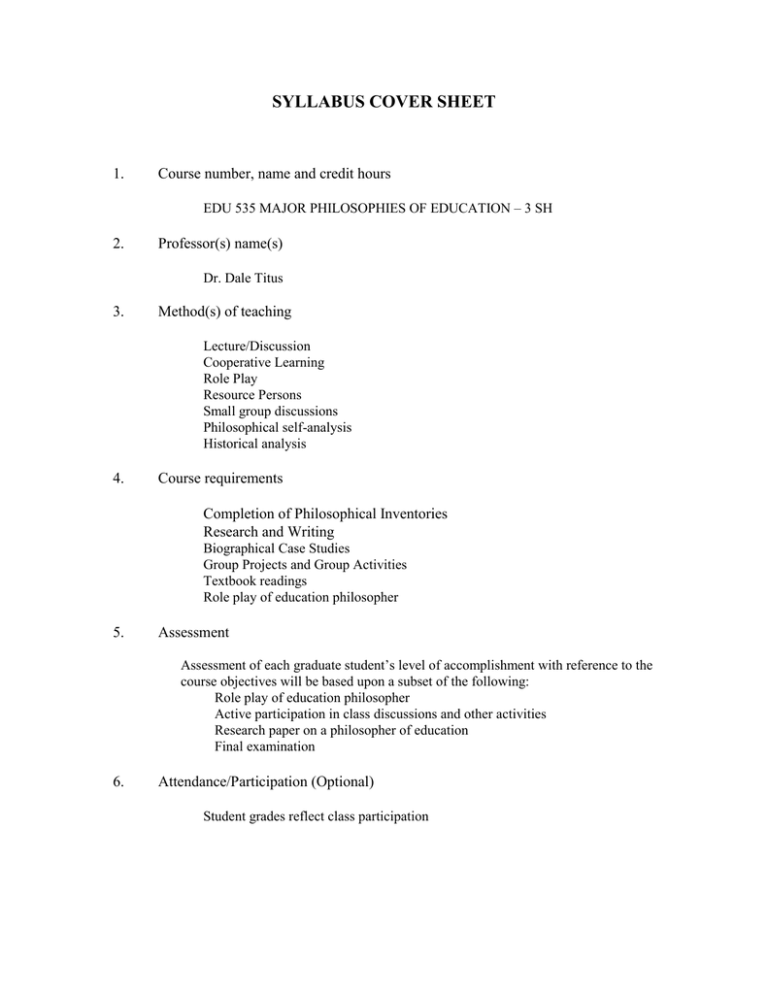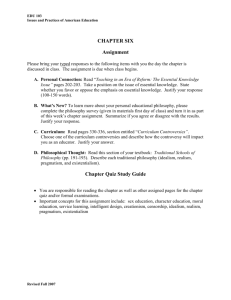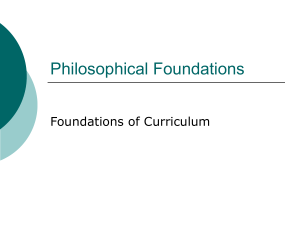SYLLABUS COVER SHEET 1. Course number, name and credit hours
advertisement

SYLLABUS COVER SHEET 1. Course number, name and credit hours EDU 535 MAJOR PHILOSOPHIES OF EDUCATION – 3 SH 2. Professor(s) name(s) Dr. Dale Titus 3. Method(s) of teaching Lecture/Discussion Cooperative Learning Role Play Resource Persons Small group discussions Philosophical self-analysis Historical analysis 4. Course requirements Completion of Philosophical Inventories Research and Writing Biographical Case Studies Group Projects and Group Activities Textbook readings Role play of education philosopher 5. Assessment Assessment of each graduate student’s level of accomplishment with reference to the course objectives will be based upon a subset of the following: Role play of education philosopher Active participation in class discussions and other activities Research paper on a philosopher of education Final examination 6. Attendance/Participation (Optional) Student grades reflect class participation 7. Textbook, required readings Ozmon, Howard & Samuel Craver. (2003) Philosophical Foundations of Education (7th ed.). Englewood Cliffs, Merrill Please Note: This course incorporates the philosophy of the Kutztown University Conceptual Framework, Teacher as Lifelong Learner, connects to the Pennsylvania Department of Education (PDE) standards, and aligns, when appropriate, to the following standards: National Council of Teachers of English (NCTE), American Council on the Teaching of Foreign Languages (ACTFL), National Council of Teachers of Mathematics (NCTM), National Science Teachers Association (NSTA), and National Council for Social Studies (NCSS). COMMONWEALTH OF PENNSYLVANIA KUTZTOWN UNIVERSITY Kutztown, Pennsylvania EDU 535 MAJOR PHILOSOPHIES OF EDUCATION SYLLABUS COURSE DESCRIPTION Theorists such as Pierce, James, Mead, Dewey, Whitehead, Russell, Kilpatrick, and Brameld are studied for their bearing on contemporary educational philosophy. Evaluation of diverse current views is also presented. The writings of such philosophers as Plato, Aristotle, and others will be studied for their contributions to current educational philosophy. RATIONALE Major Philosophies of Education is a course which examines the most important ideas in education. Graduate students in this seminar gain a deeper understanding of the philosophical underpinnings of our educational system. Students develop the cognitive processes for critical thinking, reflective practice, and self-analysis. Higher order thinking skills of synthesis, analysis, and evaluation are applied regularly. In an attempt to bridge the gap between theory and practice, educators critically analyze a variety of controversial issues in education and their related systems of thought. The primary rationale for this course is to provide educators with the requisite intellectual background with which they can effectively evaluate ideas in education. OBJECTIVES IN TEACHING THE COURSE 1. To recognize the contributions that eminent philosophers have made to fields of inquiry. 2. To apply philosophical methodologies and theories to important educational issues past and present. 3. To arrive upon a more explicit personal philosophy for each individual student in the seminar. 4. To help the student develop a sense of unity in all knowledge. 5. To differentiate between traditional and progressive schools of educational thought. 6. To recognize the educational implications of classical philosophical schools of thought (idealism, realism, neo-Thomism, experimentalism, pragmatism, and existentialism). 7. To analyze educational thought through the fundamental questions posed by the philosophical branches of ontology, epistemology, and axiology. 8. To evaluate with respect to school practice the educational philosophies of perennialism, essentialism, behaviorism, existentialism, and progressivism. 9. To compare and contrast eastern and western philosophies as they apply to teaching in a multicultural classroom. 10. To conduct critical philosophical analyses of current issues in education. ASSESSMENT Assessment of each graduate student’s level of accomplishment with reference to the course objectives will be based upon a subset of the following: Role play of education philosopher Active participation in class discussions and other activities Research paper on a philosopher of education Final examination COURSE CONTENT OUTLINE FOUNDATIONS 1. What is Philosophy? a. b. c. d. e. 2. Some introductory thoughts regarding philosophy. Theory and philosophy “The love of wisdom and the pursuit of wisdom.” Philosophy as the capstone discipline Living the reflective life. Classical Philosophies a. b. c. d. e. f. Idealism Realism Pragmatism/Experimentalism/Empiricism Existentialism Neo-Thomism Eastern FROM CHURCH TO STATE IN EDUCATION 1. Variety in Christianity a. b. 2. Most Formal: Roman and Greek Most Informal: Quaker Some Isms to be Discussed a. b. c. d. e. f. Atheism Agnosticism Polytheism Pantheism Deism Theism 3. Four Theories Regarding Human Nature 4. Early Dominance of the Church in American Education 5. From Church to State in American Education a. b. c. d. e. f. g. Education regarded as a function of the church. Clergymen were frequently the teachers. Calvinistic influence strong in New England. The Bible and catechism became core learning material. Religious sects increased in number. State government entered the picture. Religious material as cultural subject matter. 6. Public support for religious education 7. Locke’s philosophy concerning the state ESSENTIALISM AND PERENNIALSIM 1. Historical Resume a. b. 2. Platonic roots of Essentialism in the Republic Aristotle The Liberal Arts a. b. The Trivium The Quadrivium 3. Comparison of the Terms Essentialism and Perennialism 4. The Five Postulates of Essentialism a. b. c. d. e. 5. The rational nature of man. The theory of mental faculties Formal discipline Transfer of training Essential subjects How Essentialist and Perennialist Views Affect Classroom Procedure IDEALISM AND EDUCATION 1. What is Idealism? a. b. c. d. e. f. The universe is the expression of Mind, Spirit, Intelligence, First Cause, Logos, God. The Idea is Reality (Idea-ism vs. “Idealism”). Mind is the enduring substance. Concepts may be innate or abstracted from percepts. Of the two realms, the apparent (day-to-day experience) and the real (the ultimate truth of things) the latter is placed on a higher level or rank. The source of true knowledge. 2. Plato’s Two-World Concept 3. The Idealism of Kant 4. The Idealism of Hegel a. b. 5. His beliefs His dialectic How Idealism Affects the Classroom Situation a. b. c. d. e. f. g. h. i. j. Curriculum (where emphasis is placed) The role of the teacher Getting to know the pupil Attitudes regarding the pupil Seating arrangements Grouping Teaching techniques Teaching aids Discipline Evaluation and testing REALISM IN EDUCATION 1. What is Realism? 2. Views of the Early Greek Philosophers a. b. c. d. e. f. g. Thales of Miletus Anaximander Anaximines Heraclitus Xenophanes, Parmenides, and Zeno Empedocles Anaxagores h. 3. The Atomists 1) Leucippus and Democritus Aristotle’s Realism a. b. c. d. e. Aristotle’s Form-Matter hypothesis Comparison of the beliefs of Plato and Aristotle Thomas Reid’s Common Sense Realism Rousseau’s Common Sense Thesis of Independence 4. Religious Realism, Scholasticism or Thomism 5. Natural or Scientific Realism 6. John Locke’s Realism 7. Johann Herbart 8. Herbert Spencer 9. John Fiske 10. Alfred North Whitehead 11. The New Realists 12. Phenomenology in Education 13. The Critical Realists 14. The Analytic Movement in Philosophy 15. The Influence of Realism on Modern Classroom Procedures a. b. c. d. e. f. g. h. i. Classroom management 1) Seating of pupils 2) Attitude of teacher toward pupils 3) Place or role of the teacher in the classroom Kind of furniture and its arrangement Grouping Techniques of teaching Aids to teaching Discipline Rules Testing Grades and report cards PRAGMATISM IN EDUCATION 1. What is Pragmatism? a. 2. Charles Pierce a. b. c. 3. His life His general philosophy His educational philosophy Early Appearances of Beliefs Found in Pragmatism a. b. c. 5. His life His contribution to pragmatism His philosophy William James a. b. c. 4. Principle themes of this school of thought Heraclitus The Sophists Protagoras Pragmatism Compared to: a. b. Rationalism Empiricism 6. Pragmatism Metaphysics and Education 7. Pragmatism, Human Nature, and Education 8. Pragmatist Epistemology, and Education a. Dewey’s five phases or aspects of reflective thought 9. Pragmatist Values and Education 10. Dewey’s General Philosophy 11. Dewey’s Conception of “Knowledge” 12. Dewey’s Conception of “Intelligence” 13. Dewey’s Conception of “Experience” 14. The Development of Child-Centered Education a. European Antecedents 1) 2) 3) 15. Jean Jacques Rousseau a) A need for studying the child b) Nature as the guide to nurture c) Learning through Action d) The Pedagogy of interest Johann H. Pestalozzi (1746-1827) Friederich W. Froebel (1782-1852) The Effect of the Pragmatic Philosophy on Classroom Practices a. b. c. d. e. f. g. h. i. Seating Arrangement Grouping The role of the teacher The role of the pupil Teaching methods Discipline Aids to teaching Testing Evaluation and reporting RECONSTRUCTIONISM IN EDUCATION 1. Reconstructionism and Theodore Brameld a. The basic principles of Reconstructionism 2. Futurism 3. Critical Theory and Critical Pedagogy 4. Marxism and Education EASTERN PHILOSOPHY AND EDUCATION 1. Asian Indian thought and education a. b. 2. Hinduism Jain Chinese thought and education a. b. c. Confucianism Buddhism Taoism 3. Japanese thought and education a. b. 4. Middle Eastern thought and education a. b. c. 5. Zen Shintolism Judaism Christianity Islam The effects of Eastern thought in the multicultural school EXISTENTIALISM IN EDUCATION 1. What is Existentialism? a. 2. Soren Kierkagaard a. b. c. 3. His life and important works His contributions to existentialism His philosophy Jean-Paul Sartre a. b. c. 4. Principle themes of this school of thought His life and major works His contributions to existentialism His philosophy Carl Rogers a. b. His influence and major contributions His application of existentialism to psychology and education 5. Secular Humanism 6. The Effect of Existentialism on Classroom Practices BEHAVIORISM IN EDUCATION 1. What is behaviorism a. 2. Basic principles of behaviorism Philosophical Bases of Behaviorism a. b. c. 3. Philosophical Aspects of Behaviorism a. b. 4. His life and philosophy B.F. Skinner a. b. c. 6. Human Nature Cultural Design Thomas Hobbes a. 5. Realism Materialism Positivism His life and works. His contributions to behaviorism His philosophy of education. The Effect of Behaviorism on Classroom Practices. Instructional Resources EDU 535 Major Philosophies of Education Adler, M. The Paideia Proposal. New York: Macmillan, 1982. Aristotle. The Politics of Aristotle (G. Apostle and Lloyd P. Gerson trans.) Grinnell, IA: Peripatetic Press, 1986. Bagler, W. A Century of Universal School. New York: Macmillan, 1987. Becker, W. Ethics for Educational Leaders. Boston: Allyn and Bacon, 2004. Bloom, A. The Closing of the American Mind. New York: Simon and Schuster, 1987. Brameld, T. and Elam, S. Values in American Education. Bloomington, IN: PDK, 1964. Brubaker, D. Teacher as Decision Maker. New York: Corwin Press, 1993. Bull, B., Fruehling, R. and Chattery, V. The Ethics of Multicultural and Bilingual Education. New York: Teachers College Press, 1992. Caine, R.N. and Caine, G. Education on the Edge of Possibility. Alexandria, VA: ASCD, 1997. Cleary, L. and Peacock, T. Collected Wisdom: American Indian Education. Boston: Allyn and Bacon, 1998. Cohen, A. The Educational Philosophy of Martin Buber. Rutherford, NJ: Farleigh Dickenson University Press, 1983. Cohen, R. and Scheer, S. (eds.) The Work of Teachers in America: A Social History Through Stories. Mahwah, NJ: Lawrence Erlbaum, 1997. Cooper, L. Rousseau, Nature and the Problem of the Good Life. University Park: Pennsylvania State University Press, 1999. Dewey, J. Experience and Education. New York: Macmillan, 1938. Dwotkin, M. Dewey on Education. New York: Teachers College Press, 1959. Farrell, F. Subjectivity, Realism, and Postmodernism: The Recovery of the World. Cambridge, England: Cambridge University Press, 1994. Fosnot, C. (ed.) Constructivism: Theory, Perspectives, and Practice. New York: Teachers College Press, Columbia University, 1996. Freire, P. Pedagogy of the Oppressed. New York: Continuum, 1995 Giroux, H. and McLaren, P. (eds.) Critical Pedagogy, The State, and Cultural Struggle. Albany: State University of New York Press, 1989. Gutek, G. Historical and Philosophical Foundations of Education. Upper Saddle River, NJ: Prentice Hall, 1997. Gutek, G. Philosophical and Ideological Voices in Education. Boston: Allyn and Bacon, 2004. Hodgkinson, C. Educational Leadership: The Moral Art. Albany, NY: State University of New York Press, 1991. Holt, J. Growing Without Schooling: A Record of a Grass Roots Movement. Cambridge, MA: Holt Association, 1997. Hurn, C. Limits and Possibilities of Schooling. 3rd ed. Boston: Allyn & Bacon, 1993. Jacobsen, D.A. Philosophy in the Classroom. Upper Saddle River, NJ: Prentice-Hall, 1999. Lipman, M. Natasha, Vygotskian Dialogues. New York: Teachers College Press, Columbia University, 1996. Nash, R. Answering the Virtuecrats: A Moral Conversation on Character Education, 1997. Noddings, N. Philosophy of Education. Boulder, CO: Westview Press, 1995. Noll, J.W. ed. Taking Sides: Clashing Views on Controversial Educational Issues, 13th ed. Dubuque, ID: McGraw-Hill/Dushkin, 2005. Paringer, W. John Dewey and the Paradox of Liberal Reform. Albany, NY: State University of New York Press, 1990. Plato. Education: Ends and Means. Washington, DC: University Press of America, 1982. Plato. The Republic. Indianapolis, IN: Hackett, 1974. Power, E. A Legacy of Learning: A History of Western Education. Albany, NY: State University of New York Press, 1991. Provenzo, E. Religious Fundamentalism and American Education. Albany: State University of New York Press, 1990. Purpel, D. Moral and Spiritual Crisis in Education. Bergin and Garvey, 1989. Putnam, H. Pragmatism: An Open Question. Cambridge, MA: Blackwell, 1995. Reagan, T. Non-western Educational Traditions. 3rd ed. , Mahwah NJ: Lawrence Erlbaum, 2005. Reed, R. and Johnson, T. eds. Philosophical Documents in Education. 2nd ed., New York: Longman, 2000. Reitman, S. Educational Messiah Complex. New York: Caddo Gap Press, 1992. Rogers, C. Freedom to Learn. 3rd ed. New York: Merrill, 1994. Russell, B. On Education and the Good Life. New York: Boni and Liveright, 1926. Searle, J. The Construction of Social Reality. New York: Free Press, 1995. Simon, R. Teaching Against the Grain. New York: Bergin and Garvey, 1992. Strike, K. and Ternasky, L. (eds.) Ethics for Professionals in Education. New York: Teachers College Press, 1993. Watras, J. Philosophic Conflicts. Boston: Allyn and Bacon, 2004. Wink, J. Critical Pedagogy, 2nd ed. New York: Longman, 2000. Young, R. A Critical Theory of Education. New York: Teachers College Press, 1990.



